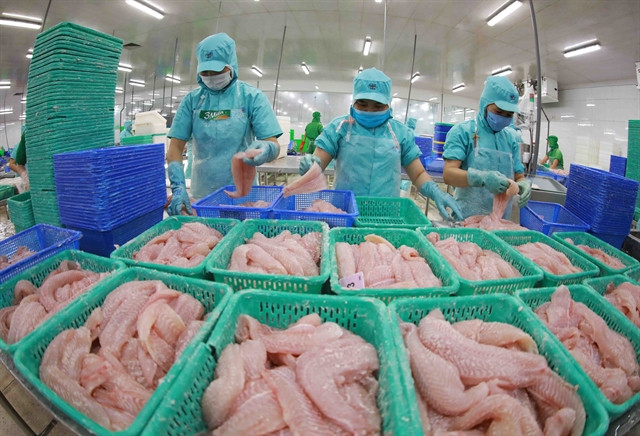Agro-forestry-fishery exports set new record
The 11-month export rose 11.8 per cent year-on-year to US$49.04 billion while imports increased 7 per cent to some $41.22 billion, resulting in a surplus of $7.82 billion, up 48 per cent year-on-year, MARD said. 
The country's agro-forestry-fishery exports stood at about US$4.27 billion in November, bringing the total turnover in the first 11 months up to $49.04 billion, higher than last year’s record of $48.6 billion, according to the Ministry of Agriculture and Rural Development (MARD).
The 11-month export rose 11.8 per cent year-on-year while imports increased 7 per cent to some $41.22 billion, resulting in a surplus of $7.82 billion, up 48 per cent year-on-year, MARD said.
Between January and November, key agricultural products brought home more than $20.73 billion, a yearly hike of 6.6 per cent; main forestry products ($15.59 billion, up 8.2 per cent); seafood ($10.14 billion, up 27 per cent); production input ($2.2 billion, up 38 per cent) and animal farming ($361.4 million, down 8.4 per cent).
Many products saw increases in both export volume and value in the period including wood products with $14.6 billion, up 9 per cent; coffee ($3.5 billion, 32 per cent); rubber ($2.9 billion, 3 per cent); rice ($3.2 billion, 9 per cent); tra fish ($2.2 billion, 62 per cent) in addition to shrimp ($4.1 billion, 15 per cent); cassava and cassava products ($1.2 billion, 3.2 per cent) and pepper ($895 million, 3.2 per cent).
Among these products, the ministry attributed tra fish’s sharp increase to the strongest annual surge in the product’s average price, at 50 per cent. Exporters have also seized an opportunity to increase their market share created by the Russia-Ukraine conflict which limits the supply of white fish.
Meanwhile, shrimp export turnover also retained good growth so far thanks to strong rises recorded in the first half of the year. In the last half, the value declined due to a decrease in market demand and a short supply of raw materials. The product’s average export price did not increase as strongly as tra fish, as it faced significant competitive pressure from those of Ecuador and India.
With these positive figures, the nation's fishery export is projected to hit $11 billion in 2022.
During the 11 months, Asian markets accounted for the largest share of Việt Nam’s agro-forestry-fishery exports at 44.7 per cent. It was followed by Americas (27.4 per cent), Europe (11.3 per cent), Oceania (1.7 per cent), and Africa (1.7 per cent).
The US remained the biggest buyer of Vietnamese goods, with $12.3 billion, making up 25 per cent of total shipments. China came next with $9.3 billion or 19.9 per cent while Japan ranked third with $3.9 billion or 7.9 per cent.
The MARD also said the 11-month agro-forestry-fishery imports included over $25.21 billion worth of key farm produce, up 4 per cent; $2.5 billion of seafood, up 40 per cent; $2.89 billion of forestry goods, up 4 per cent; and over $3 billion of animal products, down 3.2 per cent.
The ministry said it would continue to accelerate the restructuring of the industry, improve productivity and quality, and re-organise production according to specialised farming areas.
The ministry had guided localities, especially key rice growing, livestock and aquaculture areas to draw up production plans suitable to the market's needs, it said, adding that solutions to ensure a sufficient supply of food and pork, especially during the upcoming Tết holiday, would be also included.
Furthermore, the ministry would actively team up with the Ministry of Industry and Trade and the Ministry of Foreign Affairs to research and deliver analysis and forecasts of the global demand and supply of agro-forestry-fisheries goods.
Top priority would also be given to facilitating the application and transfer of science and technology and improving productivity and quality of agricultural products, it added.






